Do you know why content marketing is important to your B2B business, even though you’ve got so many other options available these days?
Here’s the answer: content marketing is a necessary part of nearly all online strategies where the ultimate goal is conversion. As a small business owner, service provider, consultant, or coach, your sales rely on content.
There are exceptions of course. If you sell physical products or low-dollar digital products online or run a local service business (like a landscaper), advertising alone may work for you.
But, when was the last time you invested in a $997 course, $5,000 website, or a $10,000 coaching program through an ad only? Higher priced offers require more nudging to help convert leads into customers over time.
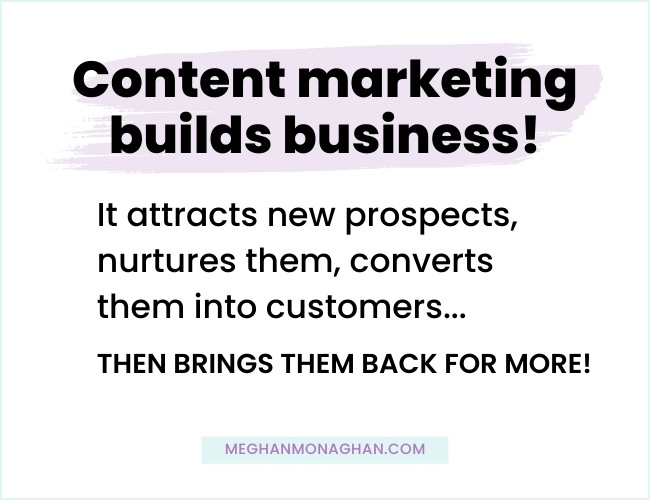
And that’s because potential clients research before buying. They review articles, emails, social media platforms, videos, podcasts, webinars, white papers, case studies, and other forms of content marketing. Content plays a role in their purchase decision process.
For this reason, let’s talk about why content marketing is important so that you can decide how it may fit into your business.
Think you don't need content marketing in your business? This article will change your mind!Click To Tweet1) Supports the Sales Process and Conversions
Like I mentioned, content marketing helps turn browsers into buyers.
By the way, a “conversion” is when a person completes an action or goal that has been identified as relevant or valuable to your business, such as:
- Viewing a video
- Signing up for a webinar
- Clicking a link
- Filling out a form
- Scheduling a call or demo
- Making a purchase
According to the Content Marketing Institute’s 2022 annual survey, B2B marketers (70%) rely most on conversions when evaluating content performance.
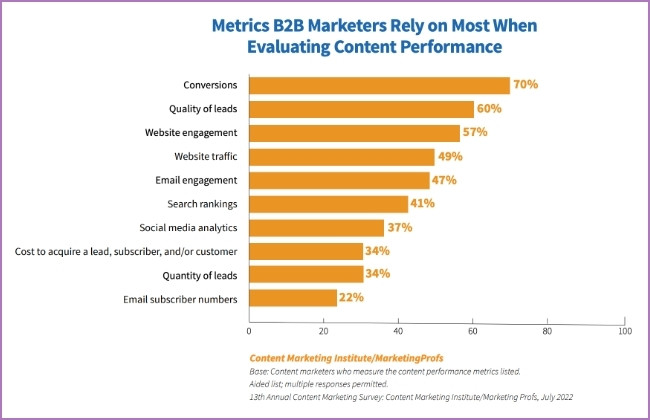
That said, these same marketers in the survey reported content marketing was most effective at these goals:
- creating brand awareness,
- building trust and credibility, and
- educating audiences.
None of these sound like conversions, though, am I right?
However, looky-loos won’t turn into customers unless they:
1) know about your brand (awareness),
2) believe that you can help them (trust), and
3) understand their challenges and that your solution is best (education).
People usually research before they buy! So, it makes sense that B2B marketers care about these three goals since they are the steps that precede sales.
While content marketing may not be the most effective direct sales strategy, about 53% of marketers report that they use it to generate sales.
After all, different types of content lead people through all stages of the buyer’s journey. This is particularly helpful for higher priced offers that may require a longer sales process. Although a phone call could speed the process along, B2B buyers usually interact with a lot of content first.
- Over 70% of B2B buyers spend over half of their research time online.
- The average buyer in 2022 uses ten or more channels as they journey through the buying process.
- Business buyers read up to 13 pieces of content before making a decision.
Content marketing supports the sales process!
2) Increases Brand Awareness and Visibility
If you don’t have a big advertising budget or a big marketing team, how will potential customers discover you? Through your content! (You knew I was going to say that!)
Another reason content marketing is important for small B2B businesses is that it helps people discover your brand online.
There is a lot of competition these days. It’s getting more difficult to stand out online. Plus, the entire marketing industry is in flux with artificial intelligence changing so much so quickly.
One thing that isn’t changing though: content builds businesses.
Content is a major factor in search engine optimization (SEO). Your blog posts and videos are what search engines use to determine when to display your content to users. And, that content is what people will consume to make buying decisions.
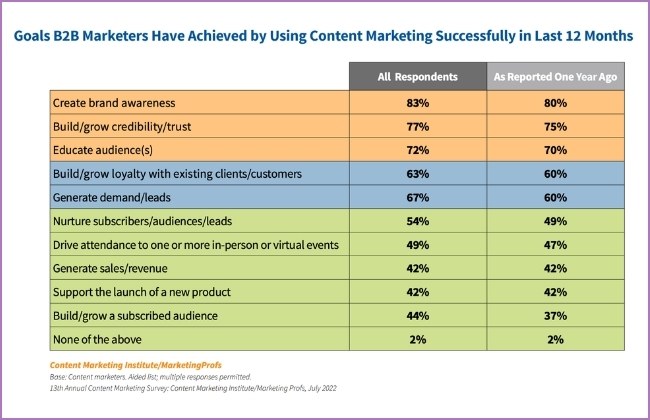
Even with all of the changes that are happening in search, high-quality content will remain one way to differentiate your business from competitors and get more website visitors.
Search-optimized content and a unique brand voice full of personality will attract leads, increase awareness, and boost visibility. However, it may take more work and investment from you, especially because AI tools will flood the internet with more content than ever.
Although increasing “brand awareness and visibility” sound like vague goals, they can be turned into measurable content marketing metrics that matter. One example is to track website visitors who come to your site via a blog post and convert into leads. Some industry folks poke fun at these two marketing goals. But, if people don’t know your business exists, then you won’t generate leads or sales.
3) Is More Effective Than Advertising
Another reason why content marketing is important for B2B is that it’s more effective when compared to advertising—both in cost and results.
On average, for small to mid-sized businesses, pay-per-click (PPC) ad campaigns cost about $15,000-$20,000 per month with an average cost-per-click of $2.59. (Source)
Of course, those numbers vary based on budget, industry, networks, and whether you’re outsourcing the work. But, two facts are consistent across the board:
- Once your ad budget dries up, your leads and sales do too 😢
- People ignore ads 🙈
On the flip side, you can get started with content marketing for no extra cost other than your time. So, that makes this approach cost effective as well as accessible to businesses with tight budgets. And, content marketing continues to work on your behalf long after your ad campaign is done.
Semrush found that 27% of marketers and business owners spend less than $1000/month on content marketing efforts whereas 53% spend more than $3,000 a month. Only 3% of the respondents said their content marketing efforts were unsuccessful.
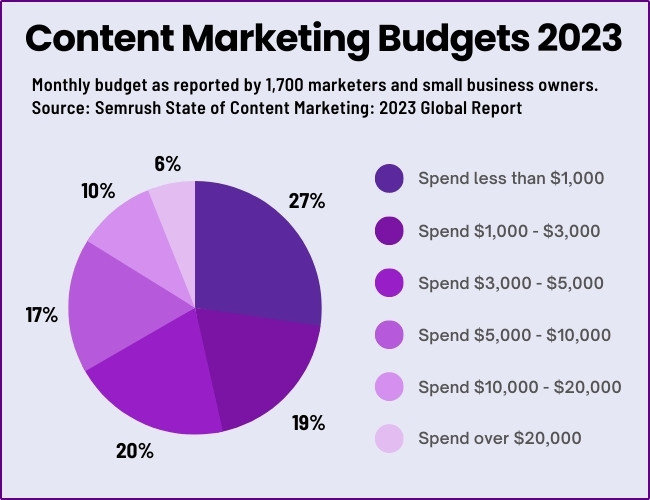
Also, how well do ads work? According to the Marketing Insider Group, digital ads don’t work. Here are a couple of eye-opening facts from them:
- A decrease in PPC and banner ad budgets decreases traffic drops but sales are unchanged. 🤔
- Their clients spend just 5% of ad budget on content marketing but see 7x ROI on average. 📈
- 36% of the clicks on paid ads are fraudulent. 🤦🏻
- When implemented properly, content marketing offers a higher ROI than PPC in the long-term.
As digital marketing expert Neil Patel shared via email, organic SEO results get 38% more clicks than paid results. And, SEO really means content marketing since they go hand-in-hand.
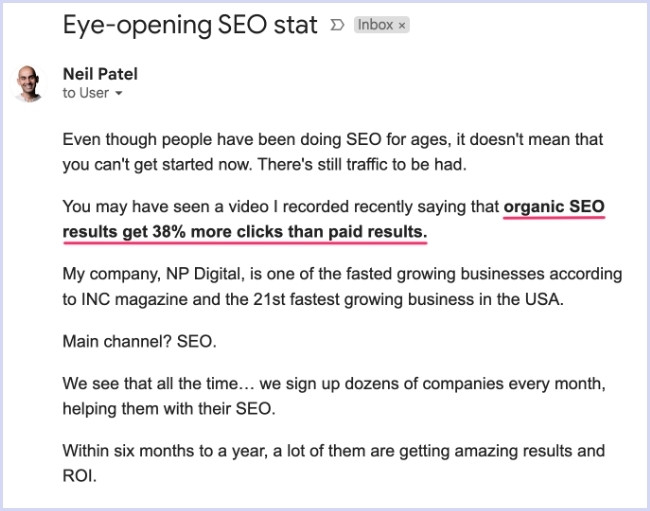
In other words, content is an effective, affordable option when compared to advertising. That also means that content marketing can be a budget-friendly option for building your business.
4) Generates Qualified Leads and Moves Them Through the Buying Process
Before a person becomes a customer, they usually become a lead first. A lead is a person that expresses interest in your brand, services, or products by providing you with their information so that you can follow up.
Lead generation is one of the biggest reasons why content marketing is important for B2B. In fact, 85% of B2B marketers use content to generate leads.
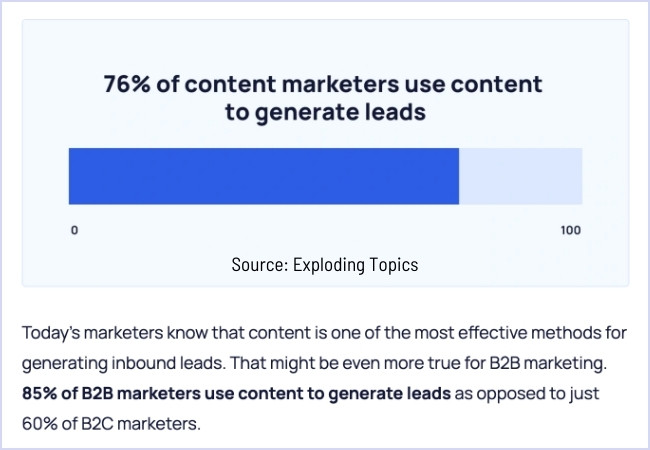
And that’s because creating strategic, relevant content that appeals to your ideal customer attracts people who are more likely to be interested in your products and services. Once they are engaged with your content—like a blog, video, or podcast— it’s the perfect time to offer something free (aka a lead magnet) in exchange for an email so that you can follow up with them.
Before or after a person becomes a lead, your content helps to move them through the different stages of the buyer’s journey so that you can educate them and guide them to the right solutions (yours!).
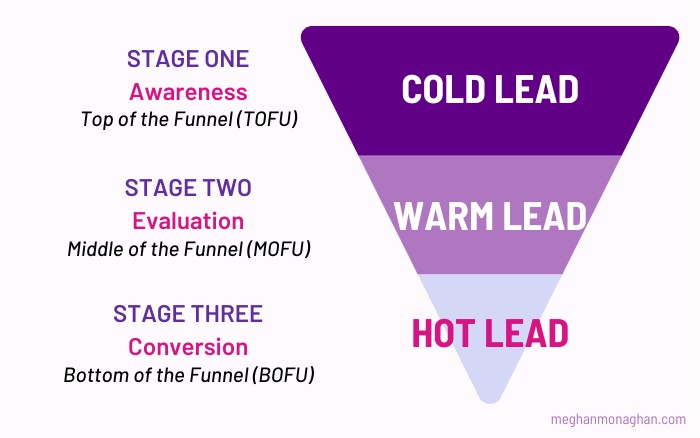
For example, people in the Awareness Stage are just starting their research into solutions and may not be ready to buy. Thus, informational content is a good starting point to address pain points and industry trends.
In fact, 54% of content marketers believe that content for awareness provides the most overall value. Only 8% believe content aimed at “ready-to-buy” audiences is the most valuable. (Exploding Topics)
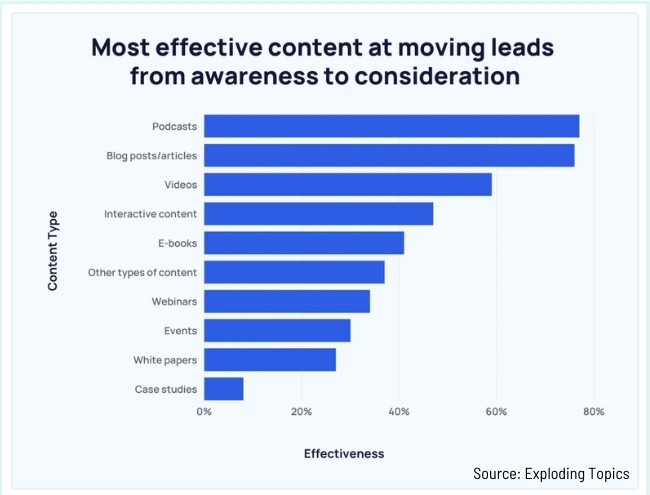
For those in the Consideration Stage, in-depth resources like white papers or webinars will showcase your expertise while helping prospects evaluate possible solutions.
And, prospects in the Decision-Making Stage may need case studies or product comparisons. This type of content demonstrates how your products/services have successfully addressed similar challenges faced by other customers or details the differences between you and the competition.
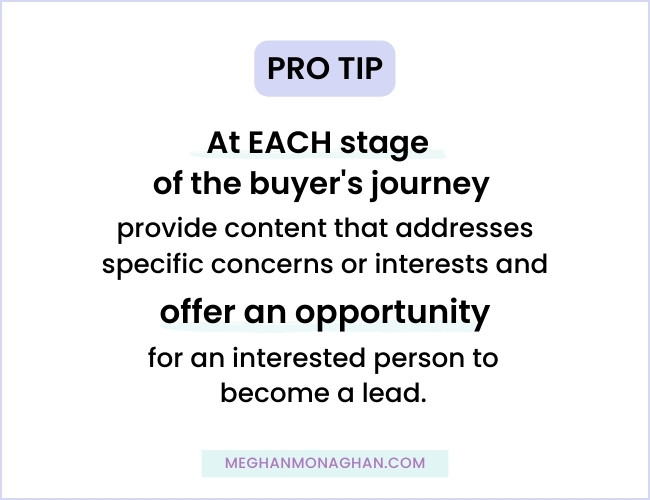
Determining the types of content and topics that appeal to your target market AND align with your offers takes skill. So, consider hiring a content marketing consultant like me to help you develop a custom content calendar and strategy.
5) Builds Trust Which Lead to Sales
Another benefit of content marketing is its ability to build trust and credibility with an audience.
Before a prospect buys, they need to believe that you:
- can solve their problem
- will deliver a solution that works
- have their best interests at heart
- intend to help them versus swindle them
And, content can convince prospective customers that you are worthy of trust. It displays your experience, shows off your expertise, and proves that you’re an authority in your field.
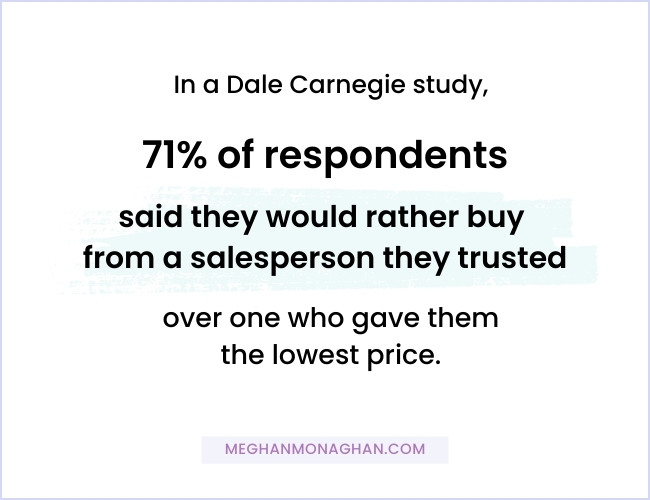
When you share authoritative content (or what I call “Clout Content”), you’re positioning yourself as a reliable and credible expert. This builds trust and confidence with your audience as well as with others in your industry. People will believe your advice and recommendations.
Often people engage with your content before they interact with a live human in your business. They form connections with your brand via your content, which is powerful from a psychological and sales perspective.
“A solid business relationship built on trust consistently contributes to long-term behaviors and emotional attitudes that result in profitable sales.” – Joseph K. Hart, President and CEO of Dale Carnegie
Why do celebrities or social media influencers have such a hold over fans? Because their content—movies, shows, videos, social posts, etc.—makes them seem familiar, attractive, and trustworthy, which translates to influence.
In a Dale Carnegie study, 71% of respondents said they would rather buy from a salesperson they trusted over one who gave them the lowest price. So, don’t assume that pricing is the only factor in purchase decisions.
The study emphasizes the need and impact of trust to the bottom line. And, content is a terrific avenue for creating that trust!
6) Improves Retention and Repeat Business
When you need returning customers or want to hold onto paying subscribers, content marketing can make a difference.
Publishing content consistently reminds customers of the value you offer and refreshes their memory as to why they need your solutions. Content also keeps your brand top of mind too.
The buying journey is a constant process. It’s not over after the first sale. You’ll need to continue to prove yourself and inform existing customers if you desire repeat business.
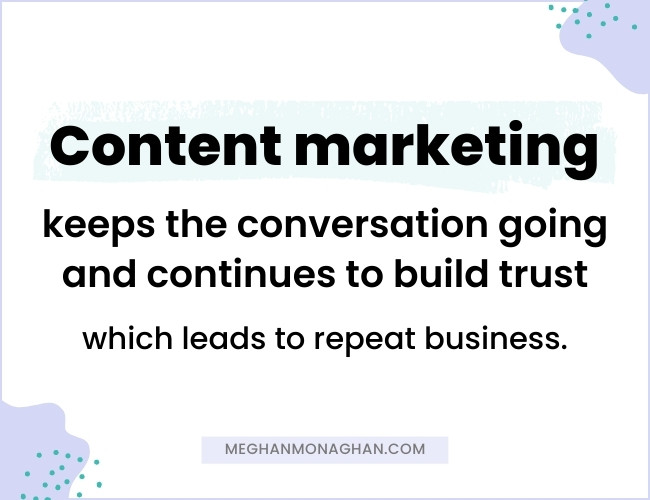
For example, after you build a website for a client, there are multiple follow up services to offer. However, the client may not know about these services or understand why they are necessary. Your follow-up content can help educate them and gently guide them to hire you for more help.
Individual reach outs, regular emailing via a list, and social posts should recommend blog posts, videos, and webinars to take previous customers through the awareness, consideration and decision-making stages again.
Content marketing is how you keep the relationship going, build loyalty, and increase retention rates. It’s how to keep the conversation going and continue to build trust.
Back to that Dale Carnegie study mentioned above: 81% of respondents indicated that they would likely buy again from a company represented by a salesperson they trust.
7) Creates Assets
In my opinion, one major perk of content marketing is that it creates assets in your business that you can reuse or even sell as part of your exit strategy. I rarely see this mentioned by content marketing experts and leaders! But this is a biggie.
Let’s look at a real-life example. Recently, a client hired me to manage a five-day challenge that included the creation of emails, social media posts, workbooks, presentation/webinar slides, a sales page, tons of graphics, and a membership site. All of that content is a gigantic asset for this client, who can put the challenge on repeat or even sell it as an online course, workshop, or corporate training.
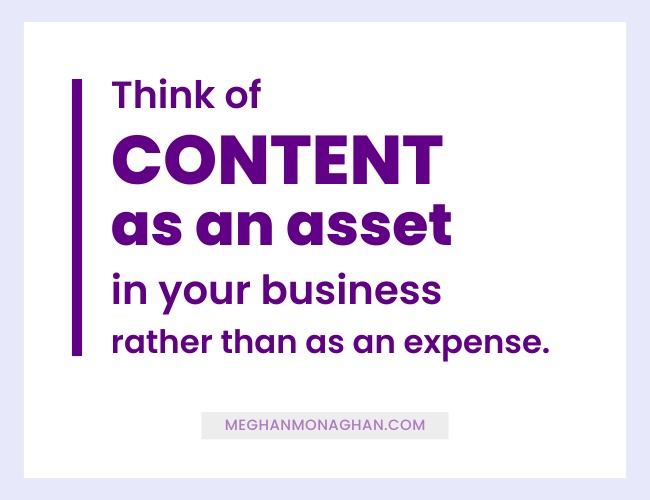
This is another reason why content marketing is important for B2B: it’s often an investment in more than just its initial intention. The challenge is just one example, but here are a few more:
- Multiple blog posts can be transformed into an eBook or guide
- Recorded webinars can be turned into membership site content for paid access
- Effective emails can become email templates to sell
- Videos can be repurposed into blog posts and podcast episodes to help boost SEO, increase awareness, and generate more leads
Let your imagination run free! Think about the influencers who are content creators. They are making money off of content. Content is their product.
Your business may be able to monetize its content as well. This will offset the cost of your content as it becomes less of an expense and more of an investment opportunity.
Listen to me talk about why content marketing is important on the Messy Desk Podcast!
The Purpose of B2B Content Marketing
I could go on and on about additional reasons why content marketing is important for B2B businesses like yours!
But, the biggest takeaway is that content marketing serves four main purposes, and those are to:
- attract potential customers by providing relevant information that addresses their needs or interests;
- build trust with prospects by demonstrating expertise in your industry;
- nurture leads throughout the sales funnel using targeted messaging at each stage; and,
- retain existing clients through ongoing communication and exclusive resources.
By doing these things, content marketing generates leads, increases conversions, and fosters long-term relationships.
Although you can get started without a significant marketing budget and a big team, don’t be fooled! Ongoing, successful, profitable content marketing requires an investment. It’s your time or someone else’s.
Consider outsourcing your content creation and management so that you focus on your area of genius and more revenue-generating tasks.
And, always start with a strategy and content calendar to identify what your next steps should be based on business goals rather than on random guesses!
